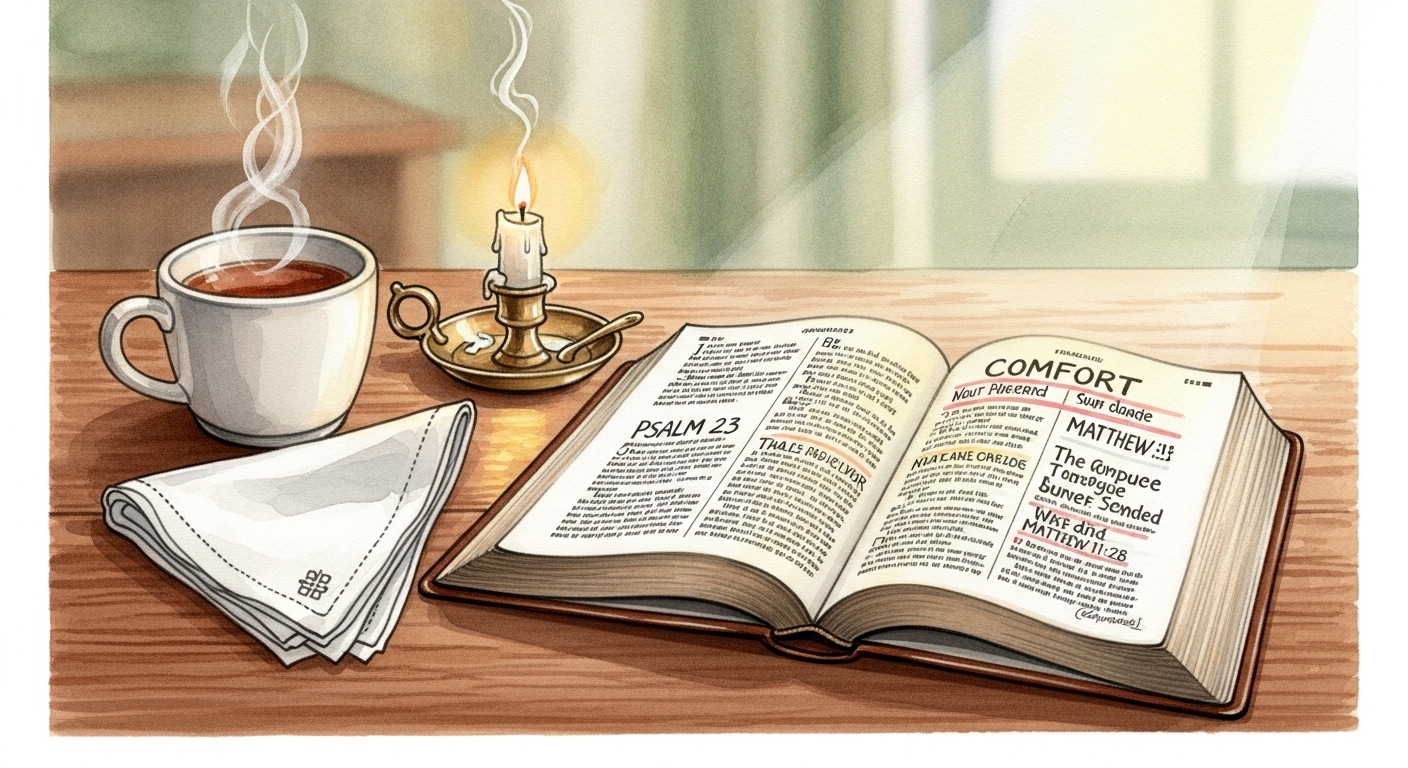The Beauty Of Trusting God Through Tears

You’ve probably known seasons when the ache in your chest feels like it might swallow you whole. Maybe it came suddenly — a loss, a diagnosis, a broken relationship — or maybe it crept in, drip by drip, until you woke up one morning and realized you’d been carrying it for years. In those moments, you can feel isolated, unsure, and tempted to think faith must look like unwavering strength. But there’s a powerful, counterintuitive truth: trusting God in pain often grows deepest through tears, not despite them.
This article explores what it looks like to be trusting God in pain. You’ll find encouragement from Scripture, practical steps to nurture trust, reflections on common doubts, and examples of how pain can be a place where God births deeper faith. Throughout, you’ll see how your tears are not wasted but may be the soil God uses to grow intimacy, resilience, and hope.
Why your tears matter
Tears are not a sign of spiritual failure. They’re part of what it means to be human — and they can be an invitation into a deeper relationship with God. When you cry, you’re confessing a need that words sometimes can’t capture. In that vulnerability, you’re positioned to experience God’s nearness in a raw and real way.
Scripture shows us that God is attentive to our tears. Consider the promise that God collects every tear: “You have kept count of my tossings; put my tears in your bottle. Are they not in your book?” Psalm 56:8. That image is startling — the God of the universe paying attention to the tears of a single life. When you are trusting God in pain, know that He notices, values, and remembers your sorrow.
Tears as a doorway to trust
Rather than hiding your tears, see them as an entry point into a conversation with God. Tears strip away pretense and can move you from religious performance to authentic dependence. When your words fail, cries become a language of the heart that God understands. Trusting God in pain is partly about allowing sorrow to humble you into honest prayer.
Jesus modeled vulnerability with tears. At the tomb of Lazarus, “Jesus wept” — a brief, powerful statement that shows his empathy and sorrow at human suffering John 11:35. If the Son of God wept, you’re not failing when you do. Instead, you’re invited into a faith that acknowledges the depth of human loss and leans on divine comfort.
The biblical foundation for trusting God in pain

Scripture gives a steady, compassionate framework for understanding suffering. It never promises that believers will be free from pain; rather, it promises that God is present with you through it, shaping your character and deepening your trust.
The psalmist declares God is close to the brokenhearted: “The Lord is close to the brokenhearted and saves those who are crushed in spirit” Psalm 34:18. That nearness is not abstract; it’s personal and practical — God’s presence is a balm for your hurt when you are trusting God in pain.
The New Testament provides the image of God as Comforter, who comforts us in our affliction so we can comfort others in theirs: “Praise be to the God and Father of our Lord Jesus Christ, the Father of compassion and the God of all comfort, who comforts us in all our troubles” 2 Corinthians 1:3-4. When you let your pain teach you how to receive His comfort, it equips you to become an instrument of his consolation to others.
Stories in Scripture: grief that led to greater trust

The Bible is honest about grief. Think of David pouring out lament in the Psalms, Jeremiah mourning a broken nation, or Jesus facing the anguish of His mission. Each story models a trajectory from pain to deeper reliance on God’s purposes.
Lamentations, a book composed of mournful poems after Jerusalem’s destruction, still points toward God’s faithful mercies: “Because of the Lord’s great love we are not consumed, for his compassions never fail. They are new every morning” Lamentations 3:22-23. When you are trusting God in pain, this perspective helps you see that sorrow does not have the final word; God’s faithfulness does.
Paul, who experienced immense suffering, used his pain to testify to God’s sustaining power and ultimate purpose: “And we know that in all things God works for the good of those who love him, who have been called according to his purpose” Romans 8:28. That doesn’t erase the difficulty of the present, but it anchors you in a hope that suffering can be enveloped in God’s redemptive design when you are trusting God in pain.
How trusting God in pain reshapes you
Pain is formative. It can harden you, or it can refine you. When you intentionally choose to trust God in pain, you begin to be reshaped in at least three ways: perspective, dependence, and compassion.
- Perspective: Pain helps you reevaluate what’s essential. When life’s anchors are stripped away, your priorities can shift toward what lasts:a relationship with God, love for others, and spiritual maturity.
- Dependence: Suffering reveals the limits of self-reliance. Trusting God in pain helps you lean into dependence rather than resentment.
- Compassion: Your wounds become a bridge to others. The empathy you develop allows you to comfort others from the place of having been comforted yourself 2 Corinthians 1:4.
Paul describes his own hardship as a way God’s power is displayed in weakness: “Therefore I will boast all the more gladly about my weaknesses, so that Christ’s power may rest on me” 2 Corinthians 12:9. When you are trusting God in pain, you can begin to see your vulnerability as a channel for divine strength.
Practical steps to nurture trust while you grieve

Trust doesn’t always feel like a feeling; it’s often a series of small, faithful acts. When you’re experiencing pain, these practices can help you stay anchored in God:
- Show up honestly before God. Let your prayers include the raw details. God can handle your questions and doubts.
- Carve out rhythm. Small, regular spiritual habits — reading Scripture, short prayers, gratitude lists — create a scaffold for faith.
- Seek community. Don’t isolate. Tell trusted friends or a pastor what you’re experiencing.
- Use sacraments and rituals. Communion, anointing, or a quiet ritual of remembrance can make God’s presence tangible.
- Remember God’s past faithfulness. Remind yourself of ways God has been true in seasons before.
These actions are concrete ways of choosing trust when it’s hard. They’re not a checklist that guarantees immediate healing, but they’re faithful responses to invite God’s presence into your sorrow.
You might wrestle with the idea that pain means God is distant, angry, or that you lack faith. Those are common fears, but they don’t hold up against Scripture or pastoral experience.
First, pain is not always punishment. While the Bible records times when suffering was a consequence of choices, it also shows sufferers who were righteous yet still experienced pain (e.g., Job). Jesus told his listeners that suffering is not always a direct indicator of moral failure John 9:1-3. When you are trusting God in pain, you allow God to be bigger than simple cause-and-effect explanations.
Second, trusting God in pain does not mean pretending to be okay. Authentic faith permits doubt, lament, and honest questioning. Hebrews invites you to approach God with confidence to receive mercy in times of need, not to hide them Hebrews 4:16.
Finally, patience with God is part of trust. You may not understand why you are suffering, but patiently waiting and continuing to seek God are acts of faith. The psalmist’s laments often end in praise because lament didn’t negate trust; it refined it Psalm 42:11.
When doubt creeps in: practical counsel
Doubt is a companion to pain. It’s okay — and actually common — to question how God could allow certain things. When doubt comes, you don’t need to hide it. Instead, you can use it as a gateway to deepen your trust.
Start by naming your doubts. Saying them out loud to God disenfranchises their power over you. Then, anchor yourself in truth where it’s possible: Scripture promises, God’s character (love, justice, mercy), and testimonies of those who have walked similar paths. Read stories of resilience and redemption; they can serve as a lifeline when your horizon feels narrow.
Also, guard your spiritual intake. When you’re in pain, what you feed your heart — whether hopeful Scriptures, encouraging sermons, or negative voices — will shape your next steps. Choose sources that point you toward truth and compassion.
Remember also the invitation to bring your emotions into an honest community. Trusted friends, counselors, or spiritual directors can hold your questions without rushing you to answers.
Hope in the middle of pain
When you are trusting God in pain, hope becomes intentional. It’s not naive optimism but a steady conviction that God is at work even when you can’t see it. You can cultivate hope by directing your eyes toward promises, not circumstances.
God’s comfort is not merely consolation; it has a formative purpose. Consider Romans: “We also glory in our sufferings, because we know that suffering produces perseverance; perseverance, character; and character, hope” Romans 5:3-4. This sequence doesn’t minimize pain, but it teaches that enduring with God can lead to deep growth and a hope that endures.
In the Psalms, hope often involves remembering: “Why, my soul, are you downcast? Put your hope in God, for I will yet praise him, my Savior and my God” Psalm 42:11. When you are trusting God in pain, practice remembering. Keep a journal of ways you’ve seen God provide, guide, or comfort in small, ordinary moments.
Community, confession, and comfort
You don’t have to carry everything alone. The Christian life is communal by design. When you allow others to enter your pain, you invite God to bring healing through people who reflect Christ’s compassion.
Confession is not only about sin; it’s about honesty. Telling someone your fear, shame, or grief is a brave step toward healing. James tells you to confess your sins to one another for healing; vulnerability in community often brings practical and spiritual support James 5:16.
Compassionate presence matters. Sometimes you don’t need answers; you need someone to sit with you, hold your hand, or bring a warm meal. Being in community helps you see that while suffering is personal, it’s not isolating. God’s comfort flows through hands and words offered by others.
Spiritual disciplines that steady trust
Certain spiritual practices can be especially steadying when you are trusting God in pain. These are habits that shape your soul and orient your heart toward God even when feelings are chaotic.
- Scripture meditation: Short, focused readings that let a verse sink in slowly.
- Breath prayers: Simple one- or two-sentence prayers you repeat to quiet your mind.
- Sabbath rest: Intentional slowing down to restore body and spirit.
- Gratitude lists: Naming small mercies, even in hard days, trains your heart to notice God’s kindness.
- Journaling: Record prayers, laments, and any answers or impressions you perceive.
These disciplines aren’t magic, but they create pathways for God’s presence to become more perceptible over time. They’re practical ways of living out trusting God in pain.
The role of worship and lament
Worship in the midst of pain looks different from celebration. It can be quiet, strained, or sung as a whisper. Lament is an ancient form of worship — it’s offering your grief to God while holding on to trust. The Psalms are a master class in lament-as-worship.
Jesus modeled both agony in the garden and trust that God’s will should be done Matthew 26:36-39. In your own life, worship and lament together let you express sorrow without abandoning faith. Lament gives you language for pain, and worship gives you a posture of trust.
Professional help and faith
Sometimes pain requires professional care. Counseling, medical treatment, or therapy are not signs of weak faith — they are tools God provides through people trained to help. If grief is debilitating, seek a counselor who respects your faith perspective and can walk with you professionally.
Faith communities often collaborate with professionals to provide holistic care. When you are trusting God in pain, integrating spiritual care with professional support can be an expression of wise stewardship over the life God has entrusted to you.
Holding paradox: God’s presence and unanswered questions
You may carry unanswered questions for years. That’s part of the tension of faith. Trusting God in pain doesn’t always resolve those questions, but it gives you a posture toward them. Rather than demanding immediate explanations, you can hold paradox: God is good even when circumstances don’t make sense.
Scripture invites you to walk with God in mystery. Job’s story ends with greater awe of God’s wisdom, not a tidy explanation for his suffering, yet he finds restoration and a renewed relationship with God Job 42:5-6. When you are trusting God in pain, you don’t have to have all the answers to still say “Lord, I trust You.”
Stories of hope: modern testimonies
Countless people have testified that trusting God in pain changed them. You might read about someone who lost a child and yet found a ministry of consolation, or about a person who survived illness and now pours energy into helping others navigate health crises. These testimonies don’t erase pain, but they show how God can transform sorrow into service, meaning, and compassion.
Hearing such stories can be a lifeline when you feel stuck. They remind you that God is at work in human lives across time and culture, often in ways that become visible only after seasons of darkness.
Practical faith: what you can start doing today
You don’t have to overhaul your life to begin trusting God in pain. Start with small, sustainable steps that meet you where you are:
- Pick one short scripture to meditate on daily for a week (e.g., Psalm 34:18).
- Tell one trusted person about your hurt and name one concrete way they can help.
- Choose one small act of self-care (a walk, a warm bath, a nourishing meal).
- Write three things you’re grateful for tonight before bed.
These small choices are faith in action — tangible ways of saying “I will lean into God” even when it’s hard.
The long view: redemption and restoration
Christian hope isn’t wishful thinking; it’s grounded in the resurrection of Jesus and the promise of restoration. The Bible looks forward to a time when mourning will end and God will wipe every tear away Revelation 21:4. That eschatological hope gives your present suffering a horizon: pain is temporary and part of a larger story that moves toward wholeness.
Until then, trusting God in pain invites you into a present experience of God’s presence and a future assurance that grief will not last forever.
A few cautions for your journey
As you walk this path, be mindful of some hazards:
- Don’t equate silence from God with absence. Silence can be God’s space to refine, not reject.
- Beware toxic positivity that minimizes your pain. Authentic community honors the full range of emotion.
- Avoid isolation. Even though you may want to withdraw, connection is where healing often begins.
Listen to your heart and to wise counsel. Allow yourself to be patient as trust grows — it often does so slowly and unevenly.
Closing reflections: your tears aren’t wasted
If you’re in pain right now, hear this: your tears are seen, your questions are welcome, and your willingness to trust God in pain matters. Tears can be a sacred act of honesty, and in that honesty, God meets you. Pain doesn’t have to be wasted; it can be a season of formation where your faith is deepened, your compassion widened, and your hope anchored in a God who walks with you.
Keep leaning into small acts of trust — honest prayer, Scripture, community, and disciplined rhythms. Let your lament be honest and your hope patient. Even when answers are slow, your tears can be the means by which God draws you nearer, teaches you dependence, and creates a new kind of beauty in your story.

Explore More
For further reading and encouragement, check out these posts:
👉 7 Bible Verses About Faith in Hard Times
👉 Job’s Faith: What We Can Learn From His Trials
👉 How To Trust God When Everything Falls Apart
👉 Why God Allows Suffering – A Biblical Perspective
👉 Faith Over Fear: How To Stand Strong In Uncertain Seasons
👉 How To Encourage Someone Struggling With Their Faith
👉 5 Prayers for Strength When You’re Feeling Weak

📘 Jesus and the Woman Caught in Adultery – Grace and Mercy Over Judgement
A powerful retelling of John 8:1-11. This book brings to life the depth of forgiveness, mercy, and God’s unwavering love.
👉 Check it now on Amazon 🛒💥
🔥 “Every great message deserves a home online.” 🌍💬🏡
Don’t let your calling stay hidden. Start a Christian blog or website using Hostinger — with 99.9% uptime, a free domain, and SSL, your voice can shine for God’s glory anytime, anywhere.
💥 Begin today. 🛒 Try it RISK-FREE! ✅
✝️ “Your body is God’s temple — care for it with purpose.” 💪💖🏛️
Renew your energy and restore balance naturally. Mitolyn helps support a healthy metabolism, giving you the vitality to live out God’s calling with strength and confidence.
🔥 Unlock Your Metabolic Power! ⚡Burn More Calories & Feel Great With Mitolyn. 💪
👉 Start Today. 🚀 Check Price Now. 🛒💰
💰 As a ClickBank & Amazon Affiliate, I earn from qualifying purchases.
📖 Acknowledgment: All Bible verses referenced in this article were accessed via Bible Gateway (or Bible Hub).
🚀 Want to explore more? 👉 Dive into our new post on Why Jesus? and experience the 🔥 life-changing truth of the Gospel!







